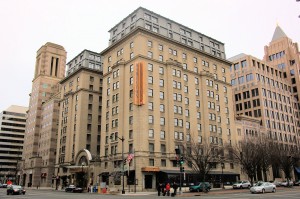Note: The CFP has passed. To see the program and other important information about the conference, go here.
CONFERENCE DESCRIPTION:
The Conference Committee of the Society for U.S. Intellectual History (S-USIH) invites full panel proposals for the seventh annual S-USIH Conference to be held at the Hamilton Crowne Plaza Hotel in downtown Washington, DC October 15-18, 2015. This year’s theme is “Problems and Their Publics.”
In his classic 1927 work of political philosophy, The Public and Its Problems, John Dewey theorized that a “public” was only called into being when problems arose that affected the common interests of large numbers of people and that required collective action in order to be solved. But Dewey fretted that “the movie, radio, cheap reading matter,” and other amusements of a growing consumer society had distracted people from attending to the most significant political problems of the day, thus making collective action much less achievable. Contemporary scholarship has often flipped Dewey on his head, arguing cultural forms, even cheap amusements, demand scholarly attention precisely because they invoke collectives, identities, discursive communities, publics. But how have “publics” been defined in the past? Around what problems have they organized, fractured, and reformed? What are the relationships, for example, between forms of media (magazines, radio, film, blogs, television), forms of entertainment (comic operas, cartoons, wild west shows), institutions (universities, museums, corporations), the state (and ideas about it, including consent, rule, and toleration), and the formation of “publics” in the past?
Although panel proposals that relate to the theme are encouraged, the committee also welcomes submissions that are relevant to any aspect of the study of American thought.
Corey Robin, a professor of political science at Brooklyn College and the CUNY Graduate Center, will deliver the keynote address. Robin is the author of Fear: The History of a Political Idea, and The Reactionary Mind: Conservatism from Edmund Burke to Sarah Palin. He is also a prolific and award-winning blogger at coreyrobin.com.
The 2015 conference will also feature three exciting plenary sessions. Kicking the conference off on Thursday night is a plenary on the topic of “Little Magazines: Past, Present, Future” that will be moderated by Sarah Leonard, who is senior editor at The Nation
. Joining Leonard will be Jackson Lears (Raritan), Dan McCarthy (The American Conservative), Rachel Rosenfelt (The New Inquiry), Chloe Schama, (The New Republic), and Bhaskar Sunkara (Jacobin).
The Friday night plenary session will be on the topic of “Public Intellectuals since Russell Jacoby’s The Last Intellectuals.” In addition to Russell Jacoby (University of California-Los Angeles), this panel will include Tim Goeglein (Focus on the Family), Jonathan Holloway (Yale University), Claire Potter, (The New School), and Leo Ribuffo (George Washington University).
The final plenary session, which will take place on Saturday night, will be on the topic of “Museums, Archives, and the Idea of the National.” This plenary features Taína Caragol (Curator for Latino Art and History, National Portrait Gallery), David Ferriero (Archivist of the United States), Eleanor Jones Harvey (Senior Curator, Smithsonian American Art Museum), and Robert C. Post (Curator Emeritus, National Museum of American History).
The 2015 conference will also feature a number of special sessions, including a panel dedicated to the winner of the S-USIH Book Prize, and panels sponsored by the African American Intellectual History Society (AAIHS), The Junto: A Group Blog on Early American History, the Society for the Advancement of American Philosophy (SAAP), and the University of Pennsylvania Press.
Submissions must take the form of proposals for full panels, which should consist of four or five members, including three academic paper presenters and one chair/commentator, or a separate chair and commentator. (If you are looking to network to find a panel or panelists go to our forum here.) Panel submissions must include an abstract for each presentation, a separate description of the panel itself, and one-page CVs for all participants that include the relevant means of contact. Abstracts for individual papers must be no longer than 250 words; panel abstracts must be no longer than 500 words.
The committee also encourages the submission of roundtable panels (a series of ten-minute prepared presentations on a topic followed by discussion among the panel and audience), “author meets critics” events, retrospectives on significant works or thinkers, or interviews. Submissions for alternate-format sessions must include a description of the proposed format, along with one-page CVs of all participants that include the relevant means of contact.
Please refer to the S-USIH website, where we will provide a networking platform for those seeking to put panels together.
In addition, please observe the following:
- The committee is especially eager to ensure a diverse representation of scholars at the conference.
- Individuals may participate in the conference in at most two capacities (paper presenter, panel respondent, roundtable participant, etc). Participants may, for example, deliver a paper and be a panel respondent, but may not present two papers.
- The committee will assume that submission to the conference is an indication that participants will be attending the entire conference. We will be unable to accommodate any scheduling requests.
- All persons appearing on the program will be required to register for the conference and to become members of S-USIH.
- Deadline for submissions is April 15, 2015. All submissions must be emailed as attachments in MS Word or PDF documents.
Send all submissions to: S-USIH Conference Committee (Andrew Hartman, Michael Kimmage, Claire Rydell Arcenas, Jonathan Wilson) s.usihconference@gmail.com
Other queries may be directed to: Andrew Hartman, 2015 Conference Chair s.usihconference@gmail.com


0